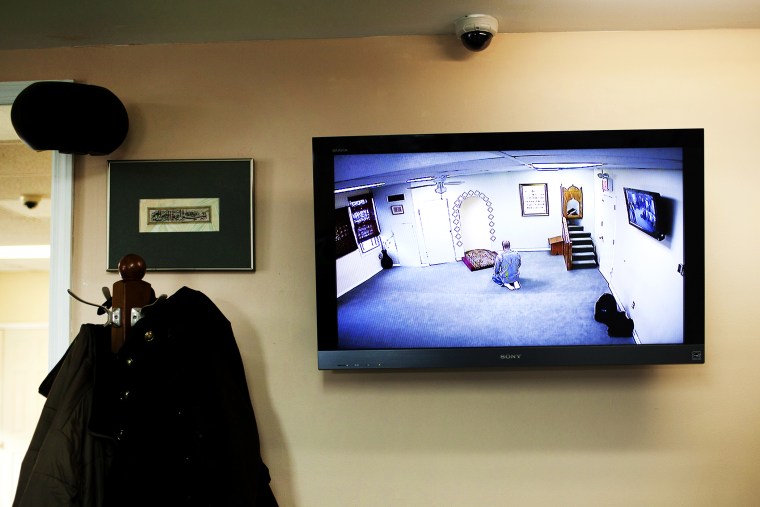Religious profiling is okay, as long as you have a really good reason.
That's the logic behind a decision reached by federal judge William Martini Thursday, in dismissing a lawsuit against New York Police Department over the NYPD's surveillance of Muslim American communities in the region.
"The police could not have monitored New Jersey for Muslim terrorist activities without monitoring the Muslim community itself," Martini wrote. "The motive for the program was not solely to discriminate against Muslims, but rather to find Muslim terrorists hiding among ordinary, law-abiding Muslims."
Any harm suffered by Muslims who were spied on, Martini wrote, was not the fault of the NYPD, but of the Associated Press reporters who first revealed the existence of the surveillance effort.
"Nowhere in the Complaint do Plaintiffs allege that they suffered harm prior to the unauthorized release of the documents by the Associated Press. This confirms that Plaintiffs’ alleged injuries flow from the Associated Press’s unauthorized disclosure of the documents," Martini wrote. "The harms are not 'fairly traceable' to any act of surveillance." The Associated Press declined to comment on the ruling.
In 2012 the Associated Press won a Pulitzer Prize for its series on the NYPD's "Demographics Unit," which engaged in blanket surveillance of American Muslims in the region beginning after Sept. 11. The NYPD made maps of local Muslim communities, spied on Muslim student organizations, and monitored Muslim businesses, all without evidence of a specific crime or intent to commit one. An NYPD official admitted in testimony under oath that despite the breadth of the program, it never resulted in a single investigation.
Shortly after the story broke, Muslim Advocates, Muslim civil rights group, and the Center for Constitutional Rights filed a lawsuit in federal court on behalf of a group of plaintiffs, including a Sayed Farhaj Hassan, a Shia Muslim U.S. Army veteran who discovered that his mosque had been surveilled as part of an effort to gauge a possible Iranian terrorist threat to New York City. Muslim Advocates and the CCR argued that the program "impermissibly and intentionally discriminates against Plaintiffs because of their religion."
Martini, a former Republican congressman from New Jersey who was appointed to the federal bench by George W. Bush, dismissed that lawsuit on Thursday, saying in effect that the NYPD was justified and that any harm to the Muslim community was not the result of NYPD surveillance, but on the decision of the Associated Press to report on the program in the first place. Martini based his decision in part on a 2009 Supreme Court decision dismissing a lawsuit against federal officials over the detention of Arab Muslim men in the immediate aftermath of Sept. 11 terrorist attacks. In that case, Justice Anthony Kennedy wrote that "It should come as no surprise that a legitimate policy directing law enforcement to arrest and detain individuals because of their suspected link to the attacks would produce a disparate, incidental impact on Arab Muslims, even though the purpose of the policy was to target neither Arabs nor Muslims."
Samuel Bagenstos, a law professor at the University of Michigan and former official in the civil rights division of the Justice Department, said that Martini's ruling appears to go further than Kennedy's. "Judge Martini seems to say that even if the NYPD selected these locations because they were frequented by Muslims, that would be okay, because the goal of the surveillance was to identify terrorist activities within the Muslim community. But that seems to me quite a different matter," Bagenstos said. "A police department cannot specifically target African-Americans for surveillance on the ground that the department is seeking to identify crime within the black community."
Baher Azmy, legal director at the Center for Constitional Rights, was harsher in his assesment of the ruling. "The opinion as summarily written, justifies wholesale discrimination against Muslims for no other reason than their religion, without any limits whatsoever," said Azmy. "It sanctions the widest form of racial profiling that I've seen in a District Court opinion in a long time."
Azmy compared Martini's ruling to Supreme Court Justice Hugo Black's opinion upholding the internment of Japanese Americans during World War II. In that opinion, Black wrote that "To cast this case into outlines of racial prejudice, without reference to the real military dangers which were presented, merely confuses the issue. [Japanese American Fred] Korematsu was not excluded from the Military Area because of hostility to him or his race. He was excluded because we are at war with the Japanese Empire[.]"
Azmy said there are echoes of that logic in Martini's ruling, which appeared to justify NYPD surveillance of Muslim communities on the grounds that there might be Muslim terrorists hiding among them.
"This is Justice Black's opinion in Korematsu: 'We're not interning them because they're Japanese, we're interning them because we're at war,'" Azmy said. "We will undoubtedly appeal. This decision cannot stand as is."
